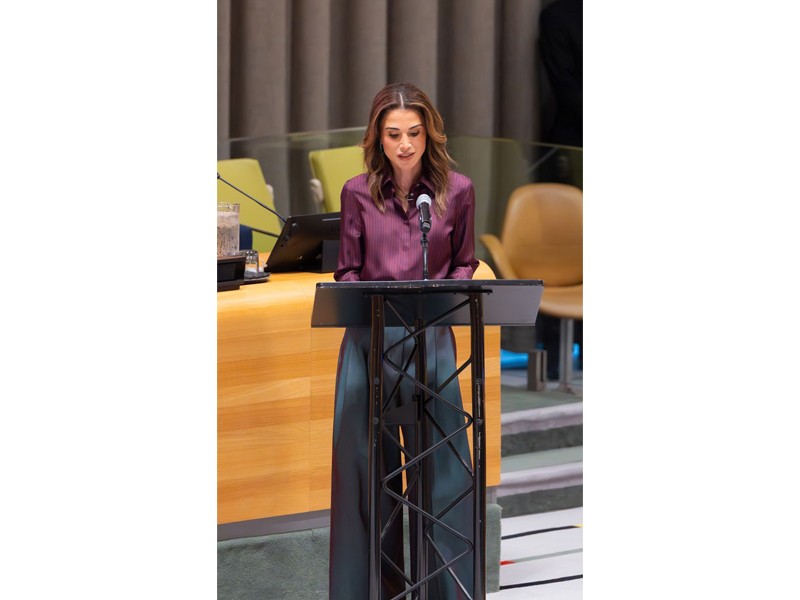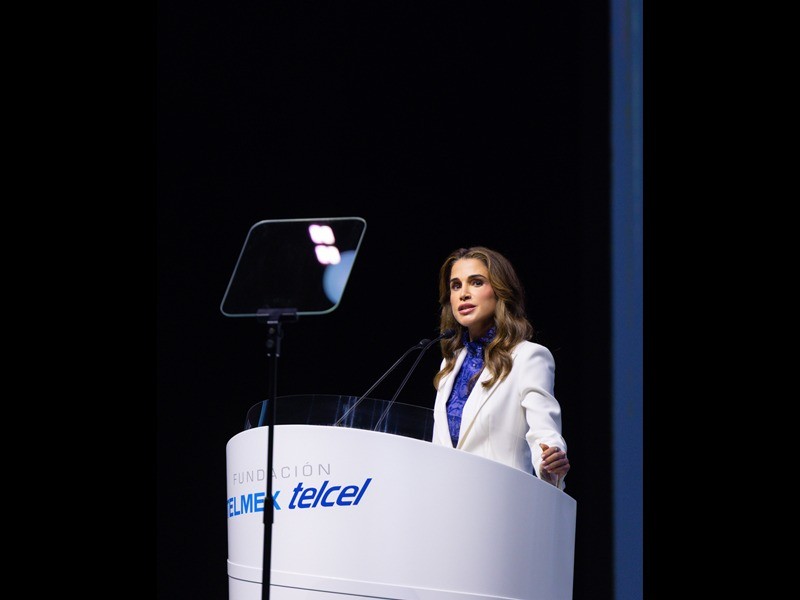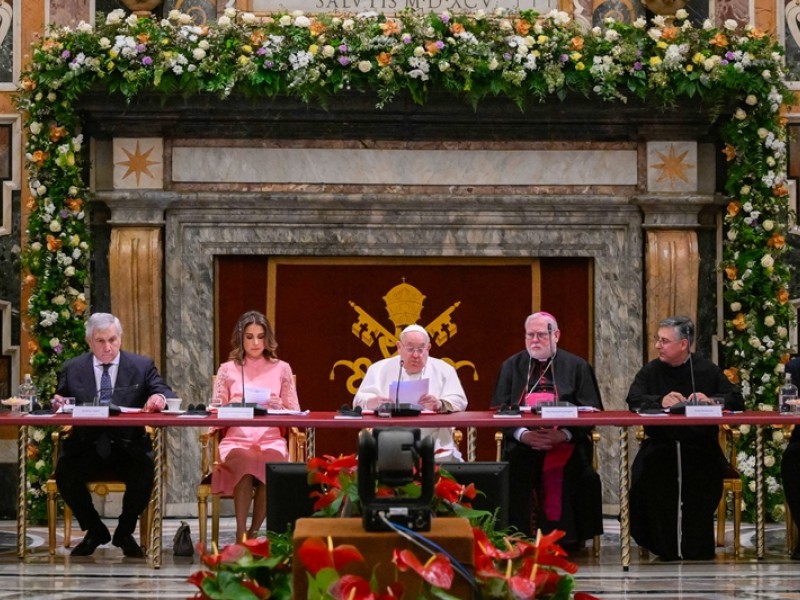Queen Rania’s Speech at the 2025 One Young World Summit - Munich, Germany
Bismillah ar-Rahman ar-Rahim.
Thank you. It’s great to be back.
Just a bit of a disclaimer – I have a bit of a cold. So, if I break into a coughing fit, please just pretend it’s a dramatic pause. I just couldn’t miss this beautiful gathering in this beautiful city.
I attended my first One Young World Summit just two years ago, in Belfast. But it’s startling to look back on how much the world has changed since.
AI has gone from popular to inescapable. Political polarization has tightened its clutches. We’ve crossed our first catastrophic climate tipping point. And global conflict has skyrocketed to its highest level in decades.
But nowhere on Earth has undergone as brutal a transformation as the Gaza Strip.
The first time we spoke was in 2023, days before the war began. Gaza’s population was already 16 years into a cruel blockade – struggling, suffocating, but surviving.
That Gaza no longer exists.
In just two years, entire cities have been flattened. Extended families have been wiped out, or reduced to a single survivor. Thousands upon thousands of children have been killed, and countless more orphaned, starved, wounded, and scarred by trauma.
For now, a shaky ceasefire remains in place. And it would be such a relief to declare the bloodshed over, release the collective tension we’ve all been carrying, and just move on.
If only it were that simple.
The enormous task of reconstruction awaits. Israel’s illegal occupation of Palestine continues. Its subjugation of the Palestinian people is ongoing. And a just resolution to this decades-long conflict, for both the Israelis and Palestinians, remains elusive.
But Gaza’s fallout hasn’t been limited to my region. I’m sure many of you have seen battlelines drawn in your own countries: your universities, your workplaces, your politics, even your dinner tables. If you’re like me, you’ve probably had countless difficult conversations on the conflict – some that brought you closer together, others that tore you apart.
Either way, opinions on this issue have been impassioned. Reactions to it, visceral. Perhaps that’s because we’ve witnessed, in real time, the raw reality of what hate looks like when it transforms from a feeling, to words, to action. We’ve been forced to confront the brutal consequences of that unraveling.
It’s not just Gaza. Around the world, we’re seeing hatred seep back into the foundations of our global community. And the danger isn’t only in what hate destroys, but in what it reshapes – our moral compass, our very sense of decency.
Hate makes a mockery of morality. It gives people permission to roll their eyes at ideals, and turn red lines into punchlines.
Online and off, in study halls and halls of power, it has become common to politicize empathy, ridicule calls for equality, and treat victims of violence with more suspicion than its perpetrators.
History shows us that we can identify hatred, condemn it, even force it underground… But it doesn’t stay there. In recent years, hate has made quite the comeback, albeit under different names:
Racism, repackaged as patriotism… supremacy as cultural pride… antisemitism and Islamophobia as free speech. Rebranded for a modern audience, hatred embeds itself by degrees – one joke, meme, and off-color comment at a time.
But hatred is not harmless. To dismiss it as “just talk” is to ignore how every genocide has begun: with words.
Dehumanizing speech has served as the prelude to some of the worst chapters in human history. In the 1930s, in this very city, the Nazi party called Jewish people “vermin.” In Rwanda, public radio broadcasts described the Tutsis as “cockroaches.” In Myanmar, nationalists compared the Rohingya to “stray dogs.”
“Just talk.” Until hateful rhetoric cleared the path for unspeakable violence.
In the aftermath of the October 7th attacks, when an Israeli official announced a complete siege on Gaza, he described the population as “human animals.” He was operating from a time-tested playbook: Convince the public you are dealing with beasts, and violence becomes not just acceptable, but necessary.
Ordinary people like you and I are portrayed as savage… so that meeting us with savagery becomes justified.
I stand here in Munich, conscious of the history that radiates through this city and this country. I know these are not easy themes to speak of here, and I say this with respect for Germany’s commitment to remembrance and responsibility.
But this is not about weighing grief or comparing pain. It is about affirming that every human life holds equal worth. Yes, every atrocity is unique, but the value of human life is universal. To defend that truth today, wherever it is under threat, is not to challenge memory, but to honor it.
Eighty years after the end of the Second World War, Germany continues to confront its past head-on, rather than turning away. And part of confronting that past is the clarity to call out the injustices of today – wherever and to whomever they occur. That is moral discipline and consistency.
History reminds us of the cost of silence.
Because hate cannot make headway without the support of its silent ally and enabler – indifference.
Hate is given license by those who refuse to approach difficult issues because, they say “it’s complicated,” when what they really mean is, “we can’t be bothered.”
Here’s what’s uncomplicated: Over and over, experts warned that, in Gaza, mass displacement, famine, and genocide were imminent. And, in the past few months, both famine and genocide have been confirmed by independent and international and UN-mandated bodies. The world saw it coming, but failed to act to prevent it.
As crises pile up, some allow themselves to grow numb to their weight. They scroll past images of suffering, avoid upsetting headlines, and disengage from the world. Daily exposure dulls the outrage. And with enough repetition, chaos, and noise, previously unimaginable horrors start to feel ordinary. Permissible. Inevitable.
But indifference is not benign either. It sustains injustice. It is a silent surrender to indecency, one small compromise at a time.
Some political thinkers have argued that atrocities aren’t always driven by bloodthirsty ideology; in fact, ordinary people are perfectly capable of extraordinary violence.
How? By failing to think for themselves.
Such “thoughtlessness” doesn’t mean a lack of intelligence, but a refusal to reflect on right and wrong… to engage with the discomfort of their own possible complicity.
Historians and scholars have echoed this: the perpetrators of humanity’s greatest crimes weren’t necessarily fearsome monsters; many were bureaucrats. They conformed, followed orders, and never stopped to consider the ethical weight of their actions.
This phenomenon isn’t unique to the darkest moments of our history. To some extent, that same impulse – to disengage, to stop thinking – is something we all struggle with.
But giving in comes with real consequences.
Indifference is a form of moral laziness. It is a willful shutdown of both the head and heart. It is choosing apathy over curiosity, comfort over engagement – all the while, betraying oneself.
And, in today’s tech-driven, often isolating world, indifference is exacerbated by loneliness, a condition affecting as many as one in six people worldwide. Without the moral and social anchor of community, people of all ages are turning to technology for comfort. But the more we rely on our screens, the deeper the void becomes.
Last year, generative-AI use was split almost equally between personal and professional needs. This year, the story has changed. The most common uses of gen-AI now include companionship, therapy, and finding purpose.
Think about that for a second. At lightning speed, we are replacing human connection with the illusion of intimacy… trying to answer life’s greatest questions with generic responses and artificial solutions.
That’s not progress; that’s an outsourcing of our thinking, our empathy, even our pursuit of higher meaning. We are carelessly handing over the keys to our humanity, not because we trust machines to do better, but because it’s convenient.
Is that the future we want? Is that the best we can do?
Without a predictable path forward, it would be easy to become disillusioned.
For many around the world, Gaza is not just a place, but a symbol. As its buildings collapsed, so too did global confidence in our world order. As its people were displaced, so too was our faith in the world’s moral compass. As its children were starved, so too was our hope that humanity would prevail.
The past two years reminded us that progress isn’t predestined. But they also bore witness to the largest, most organic grassroots movement in recent memory. Ordinary people far and wide were galvanized not by money or manipulation as some have suggested, but by a desperate urge to hold on to what remains of our humanity.
Young people in particular are demanding something different of the world – not perfection, but integrity. Youth leaders such as yourselves are compelling mankind to assess, with brutal honesty, the shortcomings of our past… in the hope that maybe, just maybe, you can stop us from repeating it.
Our ambitions are often limited by our imagination; if we cannot visualize a better future, we assume it is impossible. But the thing is: we’re not shackled to the patterns of history; we can break free of them. We can build something better, if we dare to imagine it.
Take this city. Today, Munich stands as a place of dialogue and reconciliation. Yet, it was once the birthplace of the Nazi party, an ideology that used to export hate across borders. In that Munich, this global gathering would have been unthinkable; yet here we are.
And it is now up to you to decide where we go next.
Just know that hope is not naïve optimism; it is defiant courage. It’s what drives people to call for the freedom of a people they’ve never met… to pressure their employers to live up to their own ethical standards… to donate, protest, organize, even set sail in an effort to break the siege of a famished population.
Also know, it takes more strength to love than to hate. Bearing witness to atrocities is not painless. But heartbreak is the price of being awake.
Yes, empathy invites vulnerability. It makes you pause, reflect, and face discomfort – but aren’t those the very things that keep cruelty at bay?
Those hardened by hate rarely question themselves or reflect on their own accountability. Instead, they project their problems outward, assigning blame, and turning others into symbols of everything gone wrong in their world. That impulse is born of insecurity and weakness.
I believe the defining struggle of our time is this: the pursuit of moral awakening in an era of desensitization… keeping our eyes open and preserving our capacity to feel, think, and care in a world that would prefer we didn’t.
So, I urge you to remain steadfast in your fight for our collective morality, even when well-meaning people warn you that your optimism will lead to disappointment… or countless cynics dismiss your efforts as performative or a waste of time.
The fact is, each of you can impact other people’s lives – if only in small ways – simply by showing up as you are now. That’s enough.
Do not shy away from uncomfortable conversations, emotions, and endeavors; lean into them. Cultivate them. But, most of all, sit with uneasy truths. Resist the urge to close your eyes to injustice, or to disconnect from the world.
All 8 billion of us here on Earth are alive at this moment, sharing this reality. That, in itself, binds us. We may walk different paths, but none of us are here forever. So, while we are here, let us honor life – beginning with the vulnerable and voiceless.
In this struggle, you are staying true to the essence of your soul – its capacity for higher good. The holiest war is the one fought within, against our own worst instincts. The most notable is the battle for humanity in the face of hate.
It won’t be a walk in the park; it will be painful, uncomfortable, and demoralizing at times. But that unease is a sign that you are breaking new ground – and that is when you will realize that you are exactly where you are meant to be.
Thank you all.
Featured
Queen Rania's official website
This website does not support old browsers. To view this website, Please upgrade your browser to IE 9 or greater
Your browser is out of date. It has known security flaws and may not display all features of this and other websites. Learn how to update your browser



